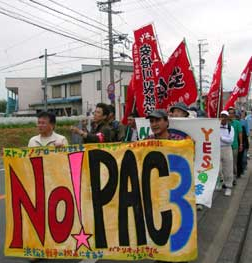 This issue of International Studies Quarterly includes an article by Andrew Yeo on the emergence of an advocacy network against foreign military bases. Aside from the minor fact that Yeo omits reference to an important recent contribution to the literature on basing politics, I found his process-tracing of the No Bases Network fascinating. Here’s the abstract:
This issue of International Studies Quarterly includes an article by Andrew Yeo on the emergence of an advocacy network against foreign military bases. Aside from the minor fact that Yeo omits reference to an important recent contribution to the literature on basing politics, I found his process-tracing of the No Bases Network fascinating. Here’s the abstract:
“Providing an overview of the emergence, characteristics, trajectory, and potential limitations of the transnational anti-base network, this article focuses on two broad questions relevant to transnational politics. First, what processes and mechanisms enabled local and transnational activists to form the international No Bases network? Second, how did activists juxtapose existing local anti-base identity and frames to emerging transnational ones? Following existing transnational movement theories, I argue that the global anti-base network slowly emerged through processes of diffusion and scale shift in its early stages. The onset of the Iraq War, however, injected new life into the transnational anti-base movement, eventually leading to the inaugural International Conference for the Abolition of Foreign Bases in 2007. Although loose transnational ties existed among anti-base activists prior to 2003, the U.S. war in Iraq presented anti-base activists the global frames necessary to accelerate the pace of diffusion, scale-shift, and brokerage, and hence, the consolidation of a transnational anti-base network. Paradoxically, however, even as No Bases leaders attempted to forge a new transnational identity, anti-base activists, as “rooted cosmopolitans,” continued to anchor their struggle in local initiatives.”
I liked this article because it’s a great substantive example of what I look for in my work: interesting ideas that could be converted to international norms and have attracted supporters but have not yet hit the mainstream human rights/human security/disarmament agenda. Yeo is interested in network emergence and identity; I’m more interested in how a network mobilized around a new idea like this manages to market itself to the mainstream NGOs who most have the ear of governments and the UN. This one’s the kind of “aha” case I like to find – something that makes intuitive sense but I hadn’t thought of or heard articulated before.
(Or does it make sense? In Empires of Trust Thomas Madden argues that the regional security provided by a hegemon’s military presence outweighs the negative externalities of military bases. Interesting counterfactual.)
Well, whether it is a good idea or not in “human security” terms, this is a network with an idea that one could imagine being promulgated as a global norm as easily as the idea of banning landmines, only you don’t hear mention of it at the global level: it’s an issue not yet “on the agenda” the way many other global problems are. And Yeo’s analysis of the Iraq war as a focusing event that triggered the consolidation of disparate domestic networks into a transnational movement suggests an obstacle this network need to overcome in order to attract support from large NGOs and achieve anything like real international norm change: the perception that this is really an anti-US movement instead of a movement to address a problem that’s inherently global.
Charli Carpenter is a Professor in the Department of Political Science at the University of Massachusetts-Amherst. She is the author of 'Innocent Women and Children': Gender, Norms and the Protection of Civilians (Ashgate, 2006), Forgetting Children Born of War: Setting the Human Rights
Agenda in Bosnia and Beyond (Columbia, 2010), and ‘Lost’ Causes: Agenda-Setting in Global Issue Networks and the Shaping of Human Security (Cornell, 2014). Her main research interests include national security ethics, the protection of civilians, the laws of war, global agenda-setting, gender and political violence, humanitarian affairs, the role of information technology in human security, and the gap between intentions and outcomes among advocates of human security.

0 Comments